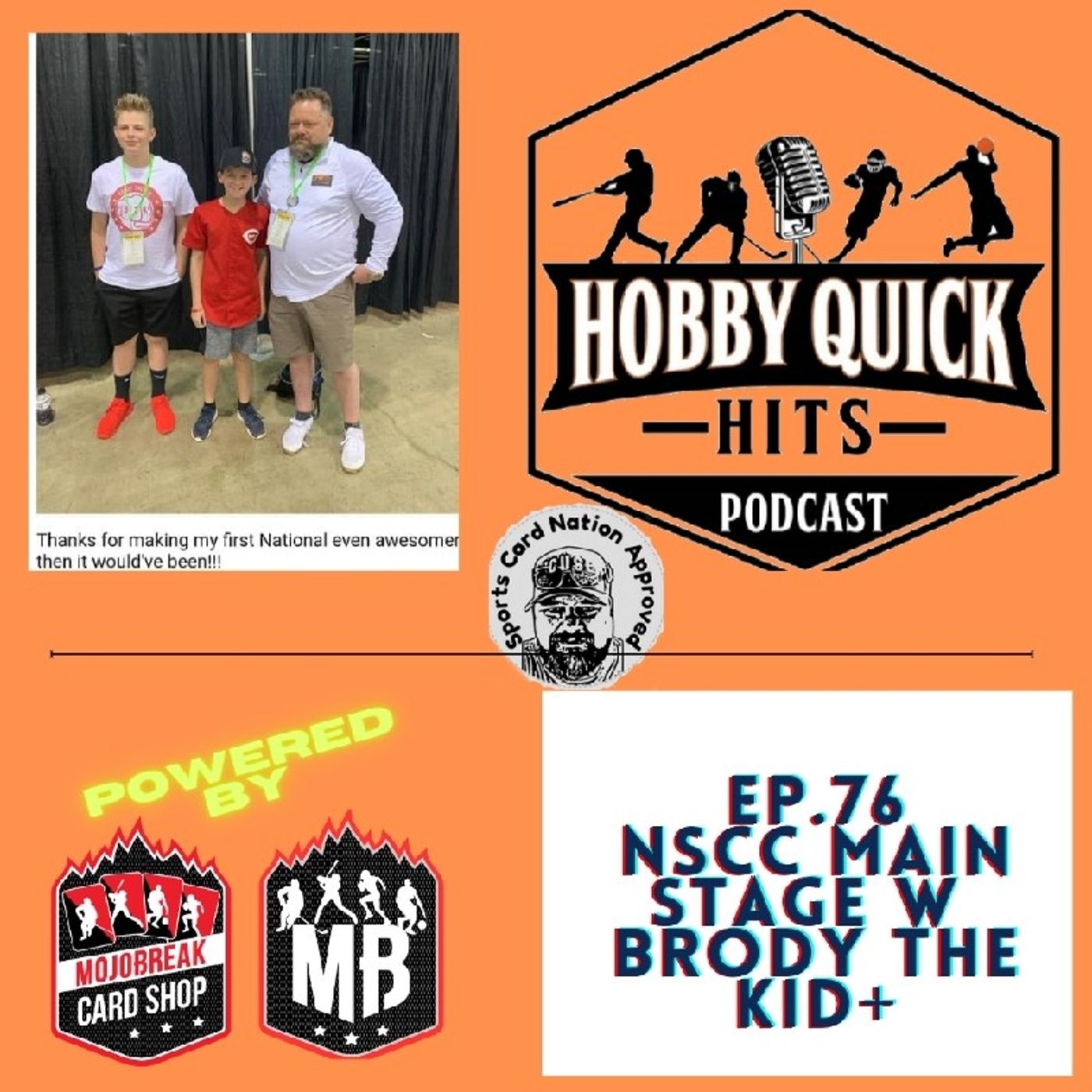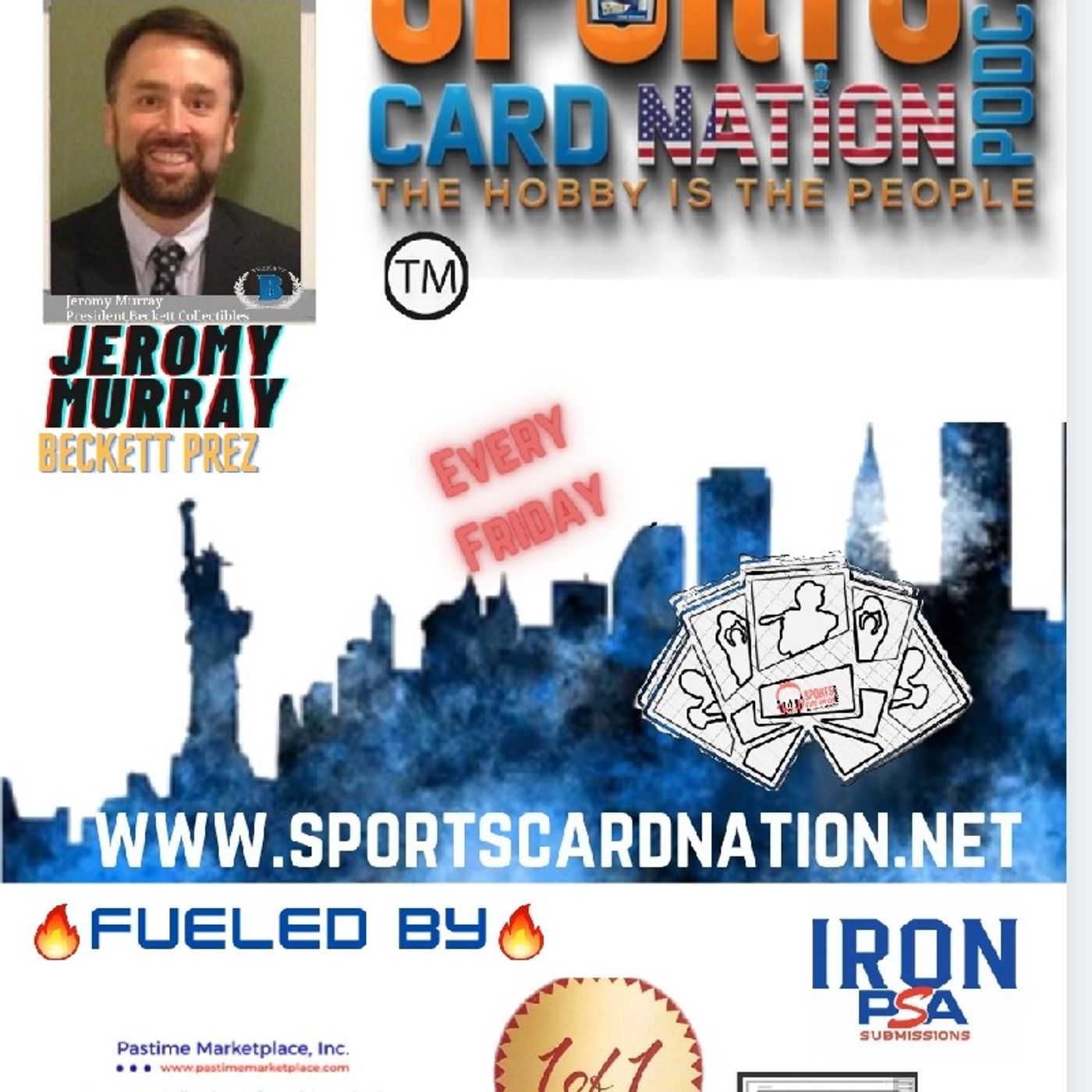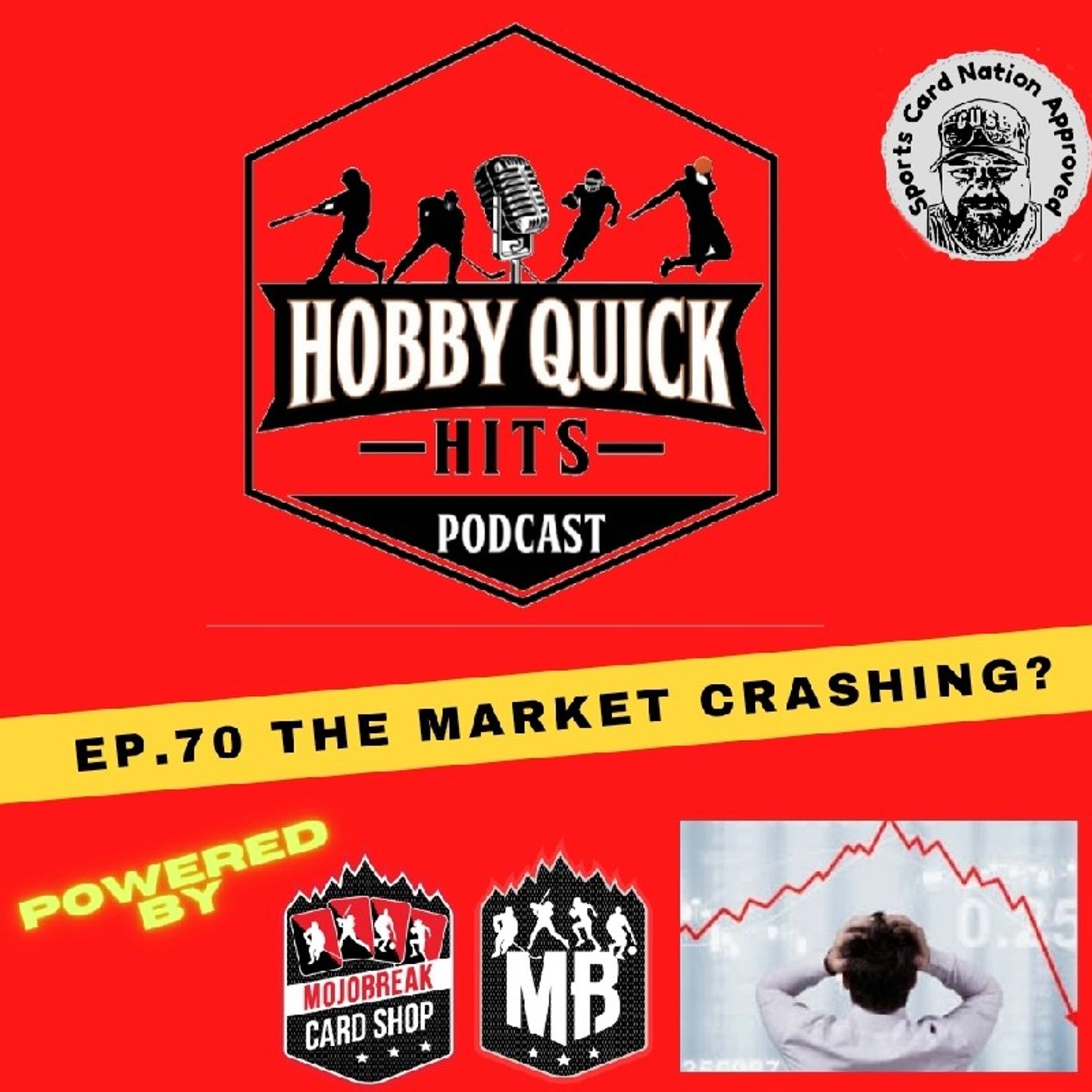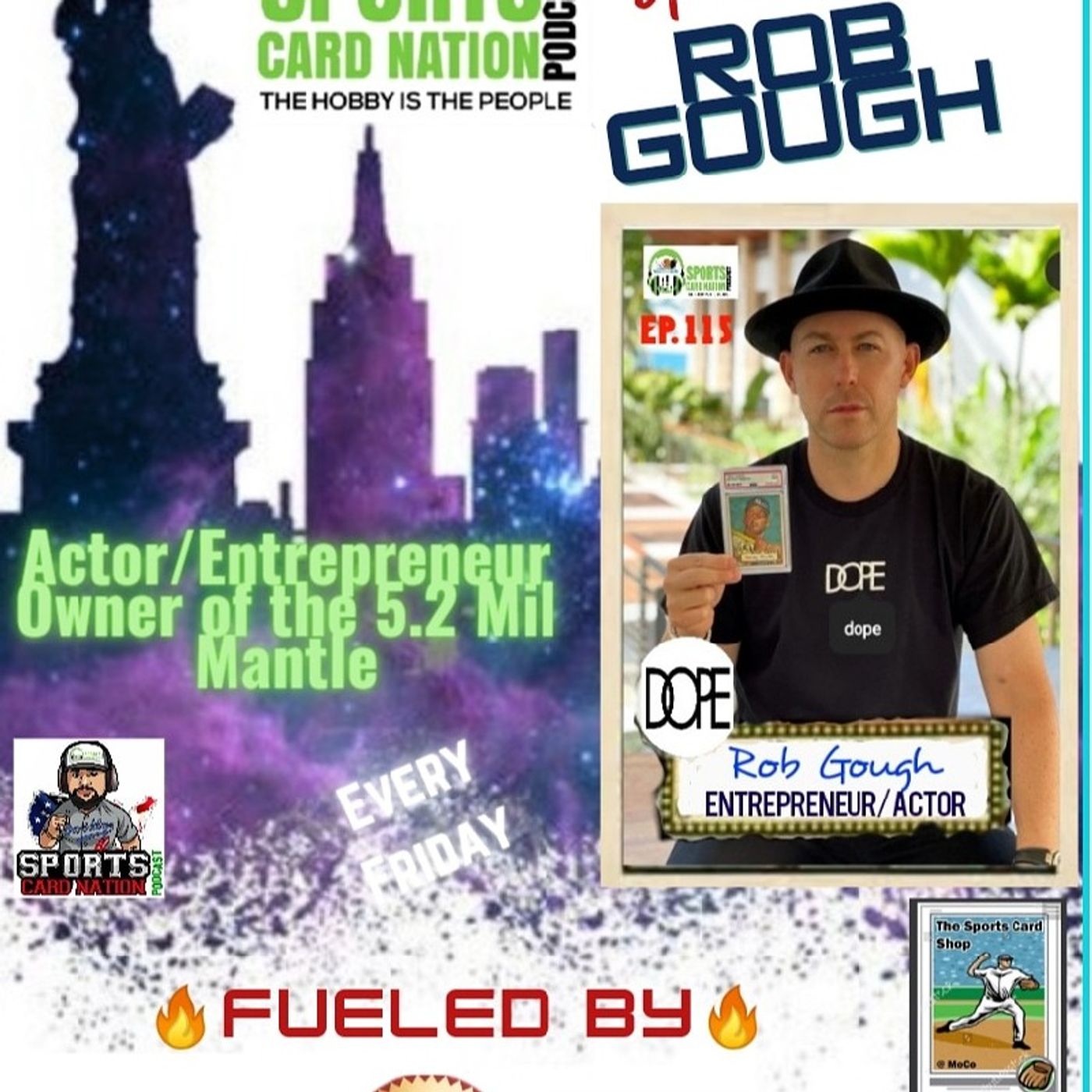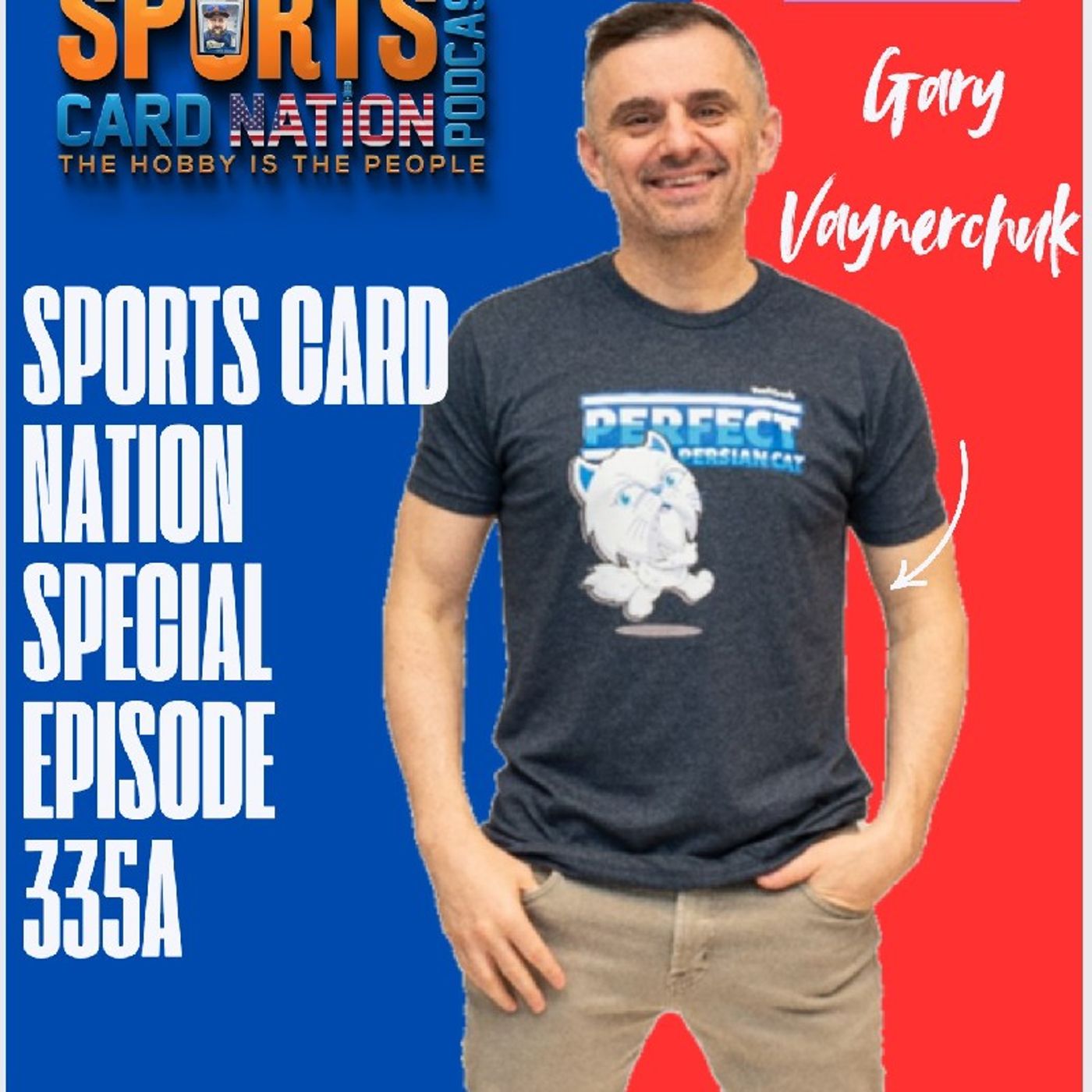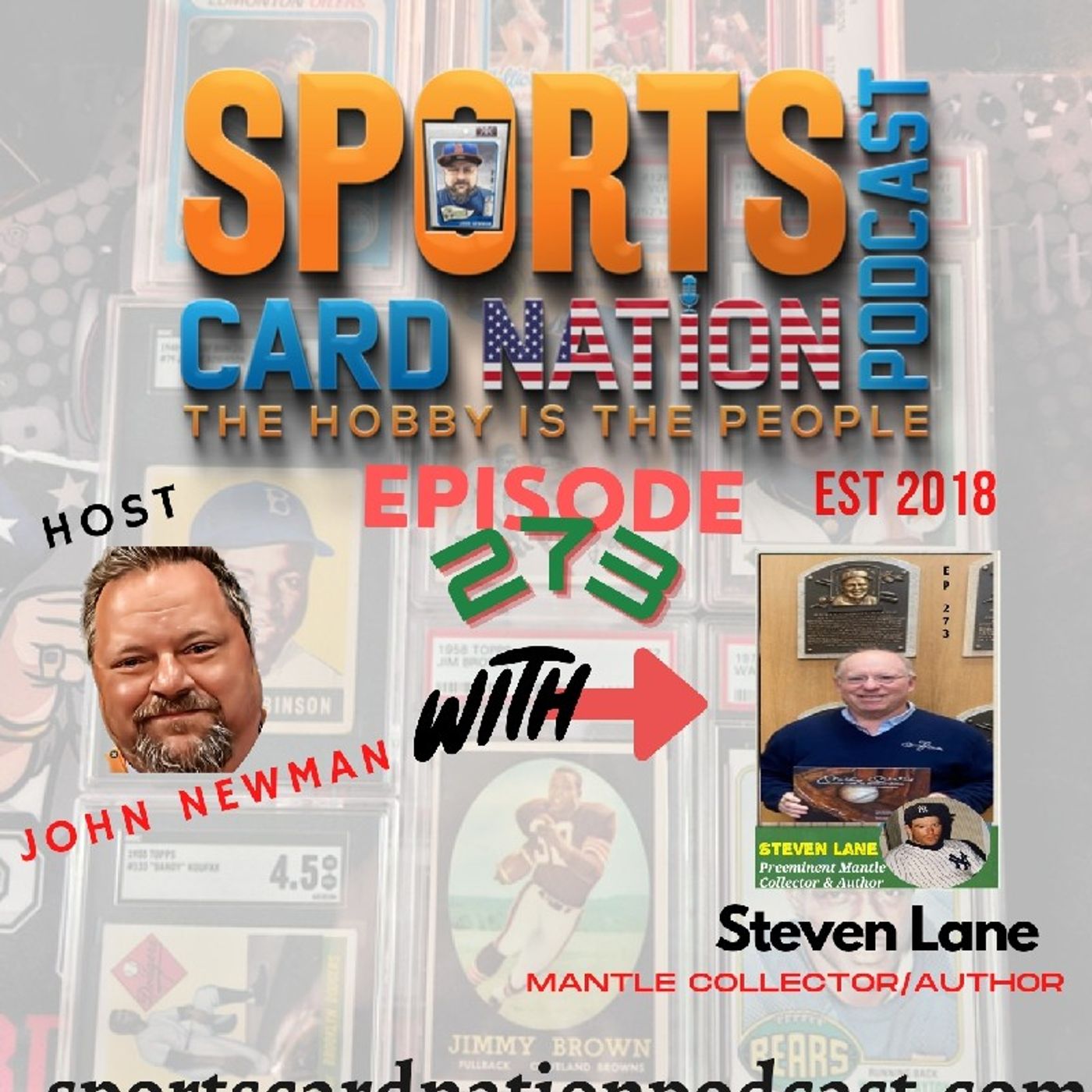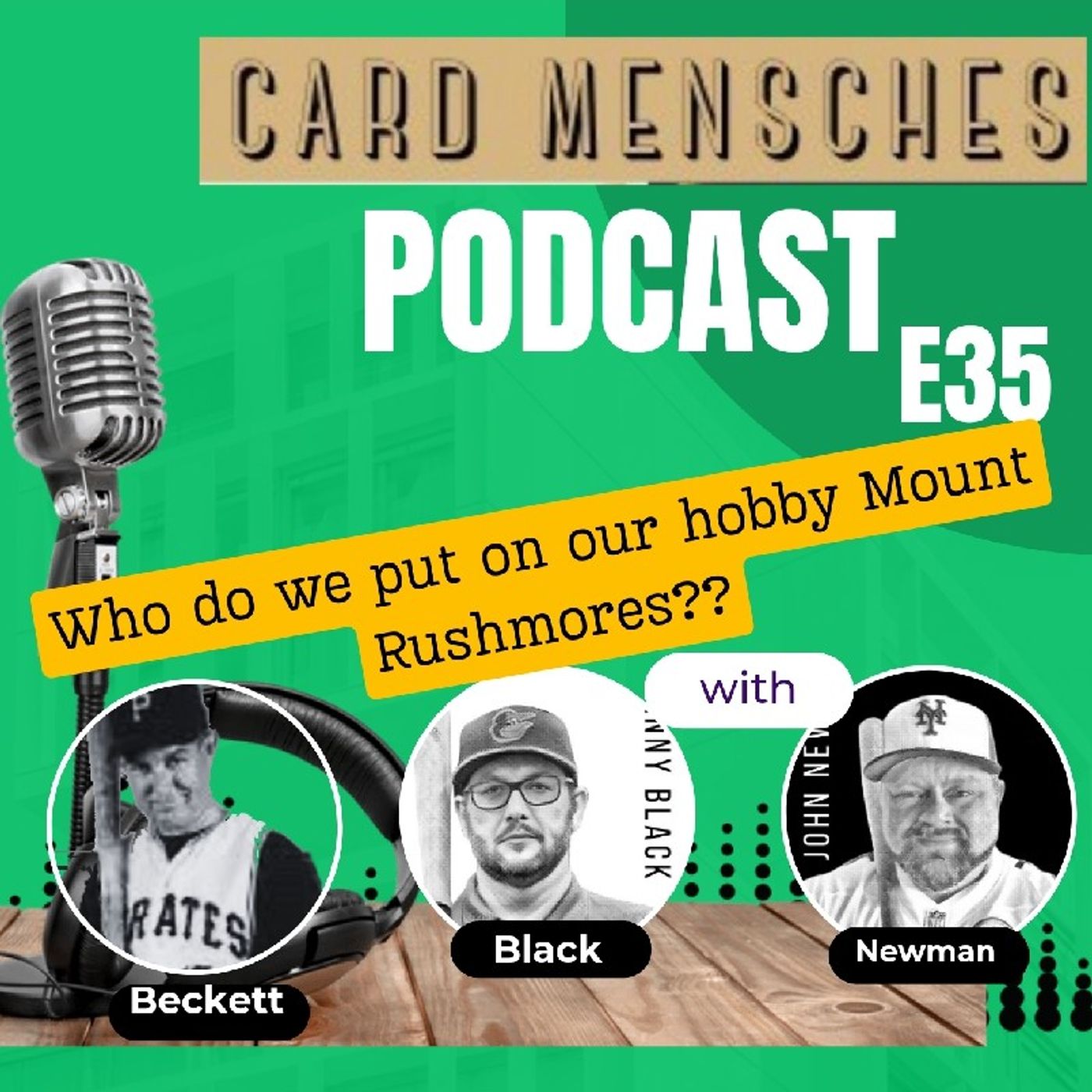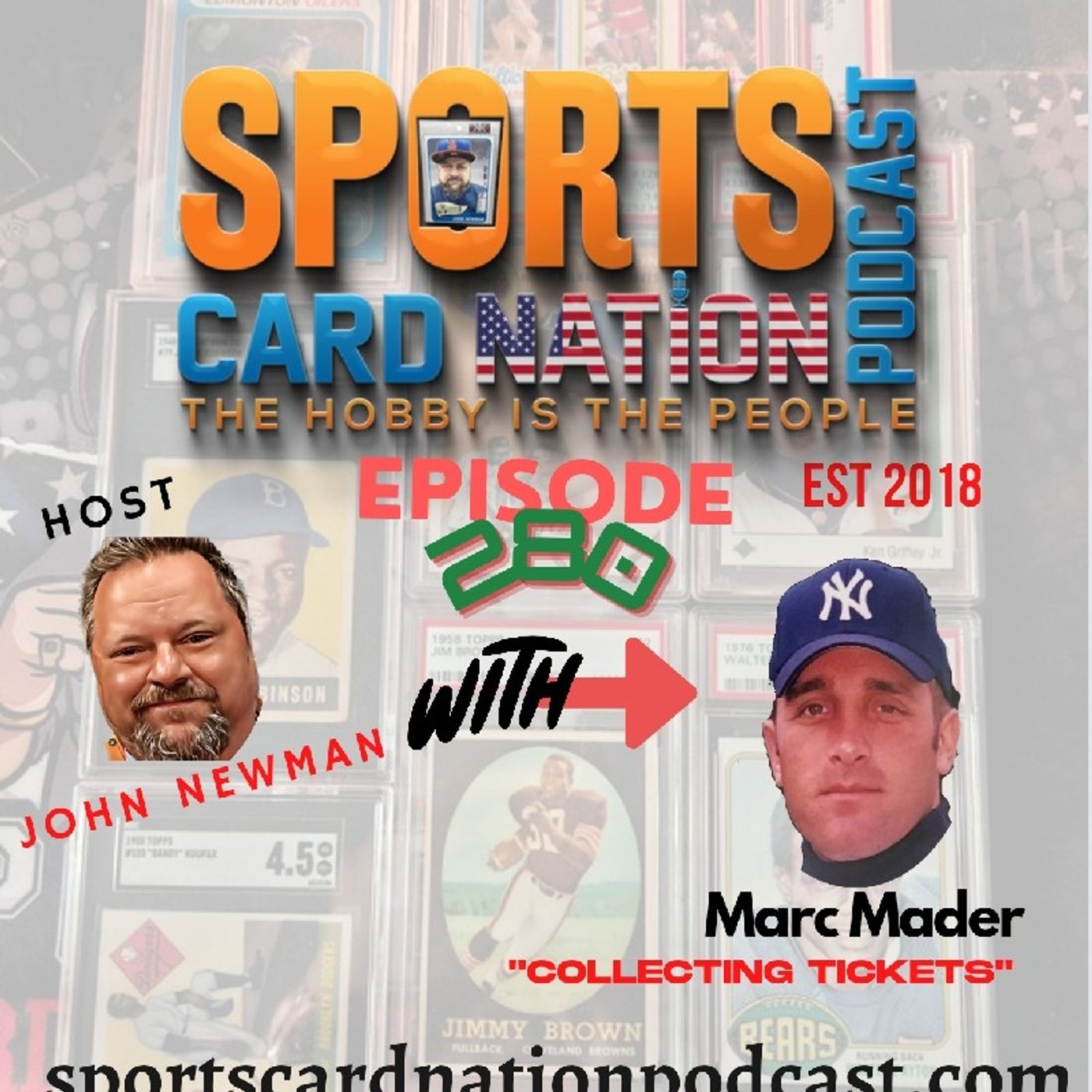Ep.281 w/ Ray Fonio of the Baseball Card Hall of Fame
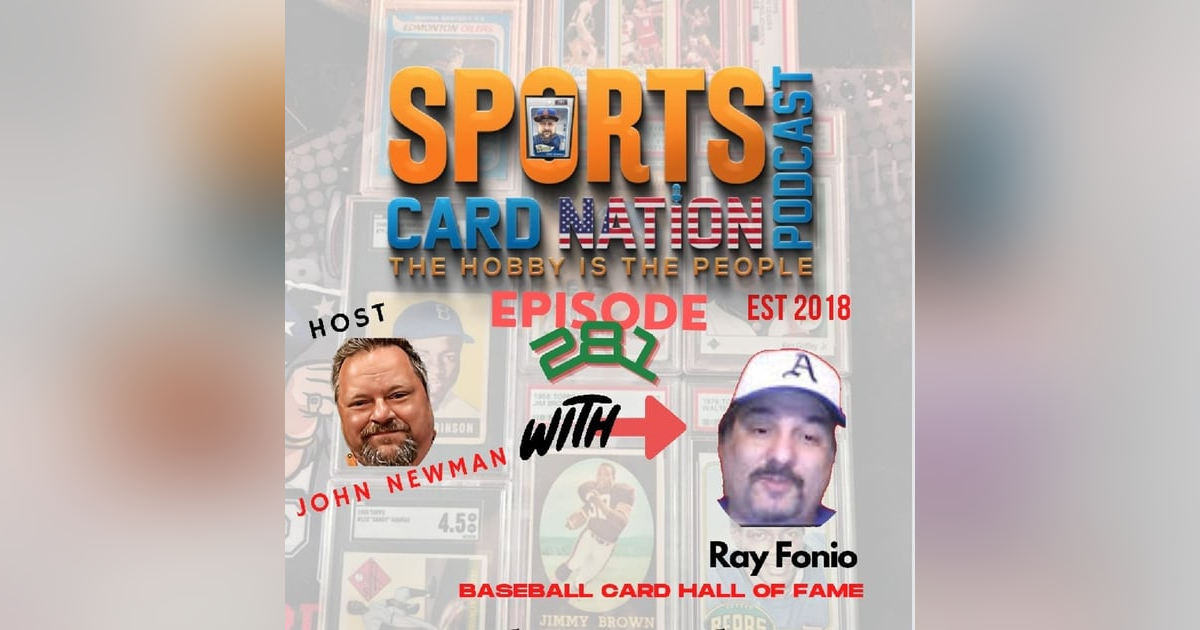
It's that time of year again and Ray Fonio of the Baseball Card Hall of Fame joins us to let us know what it is, how it works and how cards get inducted.
Follow us on Social Media:
Website:
https://www.sportscardnationpo...
.com
https://linktr.ee/Sportscardna...
Become a supporter of this podcast:
https://www.spreaker.com/podcast/sports-card-nation-podcast--4761791/support
.
SPEAKER 1: What is up everybody? Episode 281 of Sports Card Nation. As always glad to be back before we get to who to. Today's guest is little programming note, you're gonna see little tweaks to the show to get the time down to the 30 40 minute range each week.
SPEAKER 1: I think that's ideal where I wanna be at time wise with the podcast. When I listen two other shows, I think I appreciate under 60 minutes, more than over it and I know I'm guilty of going over it. So I'm not, you know, firing any shots at anybody. I'm just trying to keep the, the, the length at a reasonable time even if that means breaking up episodes in the two parts or what have you.
SPEAKER 1: So you should find going forward, you know, under 60 minute episodes from at this point. So, with that being said, and let me know what you think too. We do care about feedback and, and sometimes that's where changes come from is feedback. That's how we get better.
SPEAKER 1: Today's guest is not new to the program. Ray Fonio Ray from Philly. He's gonna be on to talk about it's that time of year again. Right. Baseball Card Hall Of Fame, induction, induction. The voting, now open, induction set for May 13th and, 40 cards on the ballot. 10 will get in 30.
SPEAKER 1: Won't, we're gonna talk about, the, the, the Card Hall Of Fame and, the, the cards that are on the list to potentially get in and this is something I support and we, we've had Rayon before to talk about it. So I hope to make it a yearly tradition. So with that being said, a quick commercial break and then we'll speak with Ray about the Baseball Card Hall Of Fame.
SPEAKER 2: Iron Sports Cards is your number one source for all your PS A and other grading submissions. Their elite status improves turnaround times. Heck, they even provide the card savers. Their chat rooms, provide updates on all your submissions.
SPEAKER 2: They also offer wax options and single cards to cover all the bases. Check them out on Facebook at Iron Sports Cards Group or on the web at Irons Sports cards.com or even give them a call at 1877 Ironps A Rob's got you covered.
SPEAKER 1: Oh, fun. Having my next guest on the sports card shop guest line. He's back once again. Ray from Philly, we're gonna be talking about the Baseball Card Hall Of Fame. It's that time of year again, the candidates are set 40 to be exact 10 will make it 30 will be on the outside looking in Ray. Welcome as always.
SPEAKER 3: Hey John, thanks for having me on again. I really appreciate it.
SPEAKER 1: Yeah, you know, at this time and it's nice because we get to do this sooner. It seems like whenever we do this, it's always and and it's my fault, it's not your fault, but it's always me trying to like scramble and, and, and get the episode in just, you know, under the bell. So this time we're gonna, we're gonna get it in early. We even moved this interview.
SPEAKER 1: But, as far as when the deadline date for voting is, we're gonna, this will air, in plenty of time, compare comparatively to times we've done this, before I know what the, the Baseball Card Hall Of Fame is. But for those that, have never heard of it or, you know, maybe even new to the hobby, I, I'll let you know this is your, your baby. I'll let you kind of give the history and, and, and where we are today with it.
SPEAKER 3: Well, yeah, thanks John. I appreciate that. Well, the Baseball Card Hall Of Fame was something that I came up with in 2018. So this is the seventh year that I've been doing this and back then in 18, I I always wondered, you know, to me, I love of two things I have always been near and dear to my heart have been baseball cards and the, the actual baseball Hall Of Fame.
SPEAKER 3: So in, in early 2018, I always wondered why the Hall Of Fame never, actually did inductions for cards cause cards in baseball are synonymous with each other.
SPEAKER 3: You know, I always felt that it would be great that they would have a showcase display, which they do now, I think it's called Shoebox Treasures or something like that.
SPEAKER 1: Yeah, they do. I've been there. See, I'm close to the baseball hall. I get, usually get there in the bare minimum a couple of times and it's funny, I think that exhibit went on to play very soon after your first.
SPEAKER 1: So maybe they stole a little bit of your thunder. But if you, I don't know if you've ever, if you haven't been there yet, it's really cool. I think they're starting to like change things out too as well.
SPEAKER 1: So, so it's different when you, when you go, if you haven't been there in a bit. But yeah, go, go ahead. Some of some of those cards that are in your Baseball Card Hall Of Fame are in that exhibit too as well. So, but go ahead. I, I just kind of wanted to jump.
SPEAKER 3: Oh yeah, that's, that was and I, I'm hoping maybe I'm, I'm glad if, if I had something to do with that and maybe it is an influence or, or something to that nature, but I'm glad they started doing something like that. So, in, in, February, I think of 2018, I came up with the idea of like, you know, having people vote for an actual virtual Baseball Card Hall Of Fame.
SPEAKER 3: It was a way to get a discussion out to talk about the history of the cards of, it was a way to get even younger people to learn about the cards and the history of certain cards that are iconic and valuable and rare and the beauty of it. It's like artwork.
SPEAKER 3: So I wanted to have 10 cards get voted in each year and have the people out there in YouTube out in the public vote for certain cards that just needed to be acknowledged and preserving the history of this hobby and the history of the game.
SPEAKER 3: So I'm glad I was able to, it's, it's grown, you know, leaps and bounds over the past several years. People. It's, it, it starts for a very friendly bar rooms type of discussion, which is always a good thing to say. Nah, you know, I think this card deserves more than this other card to get in.
SPEAKER 3: And you know how about looking at, not just rookie cards looking at certain cards that are iconic for other reasons. So it gets a really good discussion and education. I hope too, with younger people to look at cards from way back in the 18 hundreds and early 19 hundreds.
SPEAKER 1: Yeah. It, it's great and, and I'm a history guy. I, I'm a history guy. Ray, like in general, like world history.
SPEAKER 1: And so obviously, you know, we, we have the cards of, of modern day but we wouldn't be where we are today, whatever, what without whatever happened prior.
SPEAKER 1: And so I'm sort of I kind of honor that I like what you said there because, you know, you know, someone may not be in the vintage cards themselves, but we can't, just because just because of that, we can't just ignore, you know, past history because you won't, even though people who collect modern ultramodern, you wouldn't have those cards without the predecessors.
SPEAKER 1: So whether you, it or not speaking for them, you know, that's an important part of, of how the history, baseball history in this case. And I like how you tied that together because they are. So you mentioned the word synonymous. They are synonymous.
SPEAKER 1: You know, whether you collect vintage or not.
SPEAKER 1: That, that, that is synonymous. The, the pa I think in baseball, of all the sports even more. So in baseball, we look at records and, and the Hall Of Fame, you know, baseball is, is kind of the first Hall Of Fame. You think of, think of all the, all the sports.
SPEAKER 1: I, it, it makes sense and one thing I will say it's because you're, you know, it, it's crazy when I think about it's been seven years or 67 years already. Where's the time? Where's the time going, I think?
SPEAKER 1: And the other thing that cost me a little bit of money because every year when I see who the 10 that got in, I know do I have, you know, sometimes it's 234 and then I'll say, man, I don't have that. I really think I should and then I wind up having to put that on my, my want list if you will.
SPEAKER 1: So that's fun, right? That's the fun and, and, and, you know, while, while find, while money can be a factor and it's not the, the first criteria, right? It's the i the, you know how iconic the card is.
SPEAKER 1: And, and, and what it means to the hobby. Sure, the value is gonna factor in there, but it's not at the top of the list. And so sometimes you, you see some of the cards that get in and it does, you don't necessarily have to break the bank to, to get one if, if you still choose, so that I, that I appreciate that.
SPEAKER 1: As well. You have Football Hall Of Fame. We're not, we, we're obviously here to talk about the baseball one, I, I think that the big question, right.
SPEAKER 1: That, how about a basketball or hockey? I know we've talked about that, in the past, any progress there is it is I, I'm.
SPEAKER 3: Looking, I'm looking hopefully to expand and, maybe, you know, bring in the basketball Card Hall Of Fame as well because, like I, I started collecting in 1979 and, you know, at, at first when you first start collecting, you're only knowing about the current cars that is out at that time.
SPEAKER 3: So, I didn't know anything about older cars from before 1979. All I had to go by were magazines or, sport Americana. I used to have a once a year annual and that's how I learned about cards, but that's why I'm, I created something like this, especially towards that younger generation too.
SPEAKER 3: You know, here's, you know, there's older cards here to look at that you might want to learn about and educate yourself on. And the basketball card is a, a basketball card. Vintage cars especially are really awesome cards. And right now, especially in the modern world, basketball cards have just gone through the roof. They've gone crazy.
SPEAKER 3: It's just an extremely popular sport and yet that's h something, I will be able to add a third Hall Of Fame with basketball cards and then eventually hockey.
SPEAKER 1: Yeah, no doubt, no doubt. And I, I know you want to do it right. I mean, you could rush into it and just, you know what I mean? But you wanna do it the right way. You know, I know football is, is that hall is, is fun, to, to vote on, every year. Those would be my first two, in, in terms of ranking as well.
SPEAKER 1: Baseball and football, in terms of what I collect on, on the PC, side of things. So, like you said, you, you eventually, you may get get there with those. But you know, for, for, for baseball, football, you know, you and your committee are doing a great job with it.
SPEAKER 1: A change this year that you just told me about, before we started recording is you're allowing more time for when the, the 40 candidates are, are posted, you're allowing more time for people to vote than in prior years, which I, I applaud. I think that's a, a smart move. That way the, the word can spread.
SPEAKER 1: The, the people don't necessarily have to see crammed or rushed and, and can get that out there to get that vote tally up further kind of the thought.
SPEAKER 1: I'm sure you agree, but I'll let you, that was your call. So I, I it.
SPEAKER 3: Was the past couple of years, it was about three week, time frame, 2.5 weeks and it always seemed like when it was being run, it was always around, maybe the national or some other events were going on.
SPEAKER 3: There's always card shows now, this weekend, for example, in Strongsville, Ohio and there's one in New York and, and people are busy and I understand that and I just was really wanted to give a chance as I made it just a full month and get, try and get the word out there and, and give, give people a chance to not feel like they're being rushed and they can look at the list and peruse it and study about it and they might select their cards and not submit and then change their mind the next day and then they've submitted it already and they're, you know, this way they have time and I didn't want anyone to feel that they were being rushed.
SPEAKER 3: So getting the word out there and giving people an, a good ample opportunity to really look at the cards.
SPEAKER 1: Yeah, no doubt. I think that'll make a difference. I think you, your pro your vote totals will be without knowing or doing the I'm gonna venture a safe guess that you'll probably see higher vote totals for two reasons, if not more the extended time. And I think this is getting to be known more, more, more new people are coming in and saying, hey, I wanna get my vote. I voted today.
SPEAKER 1: So my vote is in, I'll, I'll, as we go through this list here shortly, I might allude to what I voted or didn't vote for. It's always tough. It's like any, any kind of Hall Of Fame, any kind of vote, right? You always leave someone off and you're like, oh, man, I don't know how I, you know, I can only vote 10 so there's 30 you can't hit the check Mark next to and go back and sort of second guess yourself.
SPEAKER 3: And I tell people that too. I say, you know, a lot of people will be checking off as they're looking at the card. I say, in my opinion, don't check off anything yet. Look at every car first because, you know, I've seen people check eight cards and, and they're not even up to the 20th card on the ballot yet.
SPEAKER 3: And I'm like, you got 20 cards left and you only have two spots open, look through everything first couple of times maybe, you know, and then go back and make your selection because I, I did that looking at it myself and I don't vote, but I was just looking at them like, oh yeah, I would do this and do that. And I'm like, man, I already have 10 and I'm, I'm only on like 23rd card. So look through it first.
SPEAKER 1: And here's a thought, here's something I just thought about and, and hearing you say that and piggybacking off even what I said, you know, when, let's look at the real baseball Hall Of Fame before the players, right?
SPEAKER 1: How they do it is anyone like five years after someone retires, everyone's on the ballot. That doesn't mean that everyone's a Hall Of Famer. But let's say I was a marginal major league player. I retire. My name will appear on the ballot. I might not get any votes. So I think I, I know this sounds great.
SPEAKER 1: It might be easier to vote for a baseball Hall Of Fame because you can throw out a lot. You know, I hate to say it like that, but you can, you know, there's a lot of people that eliminate themselves based on their, their career like they're not, they're hey, you know, nothing against the player. He's not a hall, right?
SPEAKER 3: And that's the differential with this is that people are looking at the player and not the card. It's about the card. There's players that are already in the Hall Of Fame like Billy Ripkin.
SPEAKER 3: He's not a Hall Of Fame player.
SPEAKER 4: So, but the card, it's about the card right time to hear from one of our great sponsors, but Sports Card Nation will be right back after that for nearly 50 years.
SPEAKER 5: Sports collectors Digest has been the voice of the hobby, bringing you comprehensive coverage of the sports collectible industry from industry, news, auction results, market analysis and in depth stories about collectors and their collections. Sports collectors digest has everything you need to know about.
SPEAKER 5: The hobby. S CD is also your leading source for listings of sports collectible dealers, card shops, card shows and the latest from the industry's top companies to check out all the latest news or to subscribe to the hobby's oldest magazine. Visit sports collectors, digest.com or call 1 808 29, 5561.
SPEAKER 6: Let's go. You are listening to the Sports Card Nation podcast.
SPEAKER 1: And here's the other thing, you know, even the 40 candidates for this year, every one of them. You can make a case for every one of them. You can't do that for every player on a, you know, sports Hall Of Fame. There's something like I just said, there's people you look at, you know, you know, that you say he's not a hall, I'm not even close.
SPEAKER 1: So that, that, that makes that easy. Right? With the Card Hall Of Fame, there are no that list, not because they were retired five years ago. They're on that list because they were, they were brought up by the committee as possible candidates.
SPEAKER 1: You know, you, you, so that, I think that's the difference. I think it almost makes this kind of voting tougher because like I said, I just voted for my 10 and then I looked at the 30 that I didn't click. I actually did change a couple things. I unchecked one.
SPEAKER 1: And so I didn't, my original 10, I, I made a few minor adjustments but even when I looked at the 30 in the end before I hit that submit button. Ray, even the 30 I didn't vote for. It's not a slight to them. I just only have 10 votes. It's tough. You know, it wasn't me being a jerk to 30 card. It was just tough.
SPEAKER 3: It's really tough and, and that, and I try and make and that's why when people were like, why did you pick these cards? Well, initially you have to get started somewhere. So, but after these 10 cards that have get voted in this year, I always tell people in the comments, suggest, suggest, suggest this is a community type of thing that I try and get people involved and I write them down.
SPEAKER 3: And like, for example, one of the cards in the ballot was suggested by quite a few people. The Robin Yt rookie. I took that into consideration. It's on the ballot. I mean, the people are a voice in this too.
SPEAKER 3: This is a community thing. So initially, of course, you have to get started somewhere. So I had to create the first ball. But then since then after every, every year, when 10 get bumped off, actually 15 get bumped off. And I tell people to give me suggestions, you know, for what you wanna see.
SPEAKER 1: Yeah, that, you know that Robin you out rookie is a, is a great example of, of something I was talking about when, when, when we think about the financial aspects of this too, Robin, you's a, a major league baseball Hall Of Famer. Right. That's a rookie card. It's a, yeah, it's a great card. It's not a really expensive card.
SPEAKER 1: Like if you don't have a Robin Yacht Rookie yet, I do. But if I, if I didn't or anyone else that didn't and wants to add that you don't have to break the bank for that card. That card may be one of the 10 we'll know on, on, the May 13th.
SPEAKER 1: But, even if it doesn't, it's still a great card that can be picked up for, you know, I don't, but, but compare it to some other cards even on this list or cards that are already, in, in, in the baseball card hall, it's a relatively affordable, card to be acquired and it's a great card. It just because it's affordable doesn't mean it's bad. It's just, it is what it is.
SPEAKER 1: And, you know, and, I like that, while it is an aspect, it's not the first thing. It's not because that would be easy, right? If you were just putting cards in because of their value, you know, the 52 man or the Onus Wagner T 206 would be and, and, and they are in, but they would, there wouldn't be anything to discuss.
SPEAKER 1: It would just, just, yeah, and that, to me that's, that takes the fun right out of discussing the, not just the financial aspect of, of the cards, but more so what the card meant to the hobby, what the card means to collectors, and, and, and that sort of thing. And so I think, you know, your criteria is, done, in, in, in the right way for kind of explain 12, how, how the process works.
SPEAKER 1: So there's 40 candidates on the ballot, obviously the 10 highest vote getters will be this year's class. And II, I like this rule too. Like the, what did you say? The bottom five, the one, the, the last five I have to come off the ballot for next year, right?
SPEAKER 3: The bottom five votes will get bumped off for next year's ballot. I haven't decided for how long, maybe a year, maybe two years.
SPEAKER 3: Probably more so like a twoyear span only because instead of like the top 10 get voted in and that creates 10 new openings. Well, I wanted to keep it fresh by having a lot of new cards each year. So I said, suggested that, you know, taking off the bottom five.
SPEAKER 3: So now instead of 10 new cards, it's 15 new cards, which is a pretty nice significant turnover each year, right? So, with the 10 coming off, that are the top 10 and the bottom five that will get bumped off.
SPEAKER 3: And they could make it back on and actually two cards did make it back on that were on the ballot a few years ago.
SPEAKER 1: Yeah. And I like that because it, it allows you to bring a few fresher cards into the mix and for those voting. Right, it, it takes away a little bit of the redundancy. Not that there's anything, these are all great candidates, even, even the five that will get bumped off.
SPEAKER 1: They, you can make an argument they should be in, they just whatever out of people, it's the people voting, right? It's the people voting and so, the masses speak, but there might be five candidates that some of those five that get bumped off. We have other people voted him in. They just didn't get enough votes to not be in, the bottom five. And so that's the, the beauty in it.
SPEAKER 1: But it also allows you to introduce five more cards than you would have if, without that rule. And that makes it makes, makes sense to me. I don't think anyone can argue that and anyone who gets mad like if someone gets mad said, well, that was my card now. It's not even on the ballot next, it could come back on.
SPEAKER 1: Yeah, like you said, it can come back on. But hey, listen, the people spoke like it was your car, you know, your vote but not enough other people agreed with you. Unfortunately, at this point, like you said, they can come back on sentiments, can, could change a lot of it's to raise who's on the ballot. It's like any hall, right?
SPEAKER 1: You know, there's, there's guys that don't get in because, because other choices that people rank ahead of them and they're not saying, hey, this card's terrible. They're just saying I like this card better. So that, that's a factor too that, that's how it works in the Real Hall is, is some players don't get in just because of, of better quality players.
SPEAKER 1: And then when they're kind of that those guys are already in, then it's their turn to finally step through, step through the doors and, and, you know, get in, get into the hole. So, is that the one is that the only cha I know, you know, the extended voting time and that, are there any other changes for people who have voted before?
SPEAKER 3: No, that's pretty much it. It's pretty simple. Cut and dry. Pick 10 cards submit only one ballot.
SPEAKER 3: It's on an honor system really. And, and that's it. And then make a suggestion and post a comment and, you know, and I've gotten quite a few suggestions already.
SPEAKER 3: And that's it and have fun with it and take it from there. No, no other major changes.
SPEAKER 1: No, that's g that's good. And we, we're gonna get to that list here in, in, in a few minutes.
SPEAKER 1: How, how enthusiastic does the, the meeting go, when, when you're discussing cans? Does it get, I don't wanna say heated. I don't, I, I, I'm not in the room but does it get to do, does it, do people really get fired up about like, hey, we, this has to be in, in other words, to get to the 40 the kind of, you know, briefly kind of how does that all happen?
SPEAKER 3: Well, when people make suggestions on there, I'll take it into consideration definitely. And I, I, I'd like for them just not to just say you this card should be in there without really any reason, like give me a kind of a reason what your thoughts are on that card.
SPEAKER 3: And to me, the, the stipulation was the popularity of the card, not the player, the popularity of the card, the iconic of the card, how rare it is and the value of the card, those four things to me stood out and alone.
SPEAKER 3: I initially the, the and it was really easy initially.
SPEAKER 3: I used this, you know, this year is the first year where it's by myself on the committee.
SPEAKER 3: My two other committee guys, Victor and Mike have moved on schedule conflicts is wouldn't permit them to continue on. I wish them luck in the future and everything they do. They were a big help to me and I really appreciate it.
SPEAKER 3: But initially the 1st 40 that I the three of us discussed was really easy.
SPEAKER 3: You know, nobody argued on anything. We all looked at each other and, and just agreed like, yeah, the it was initially thought to be spread out of over a lot of decades so that the younger generation can look at some of the more modern cards as well. That I would have to say that was kind of my only change this year as well besides the, the length of time was I didn't really pick too many modern cards this year.
SPEAKER 3: Beings that I really feel that the older ones, have to get into the hall first before anything, say from the two thousands or 2000 tens or anything like that, that those cards aren't great. But I figured they're just too new and they have time to get in before cards that are 80 90 100 years old, that, you know, like a player, I've been waiting for a long time so to get into the hall.
SPEAKER 3: So that really was, another slight change that, you know, I didn't pick too many say from the late nineties or early two thousands. There is some cards left over on the ballot from that time era, from the nineties and early two thousands.
SPEAKER 3: Like the Cabrera, Ichiro pool holes rookie still on there. It didn't get bumped off. So, yeah, I mean, it, it was really kind of simple on the initial 40 was very kind of easy. Just, you know, picking cards and then, from here on out, I, I asked for people to give suggestions and not only give me a suggestion but kind of give me just a one or two sentence short, you know, synopsis of why you think that card should be in.
SPEAKER 3: And it's so far, I'm getting a lot of responses of people making a suggestion. I think you should take a look at this one. This one's for such and such. Cool and I jot it down and I listen to what they're saying. So it's been really cool.
SPEAKER 1: Yeah, and I, and I agree with you with some of the vintage in, in pre war, right? Those things should, should in a sense, get kind of I don't know if you want to say preferential treatment but going into the first class, you know, white glove treatment because like you said, the the modern cards of the two thousands and, and up they're gonna have plenty of time, right?
SPEAKER 1: And in some of those cases, those players are actually still playing. So they're adding to the, the legacy of the player, them themselves as well. So I don't think anyone can argue that too much.
SPEAKER 1: Either Ray I think.
SPEAKER 3: And, and that's how it started in the beginning, in the beginning. There wasn't a ballot my first year doing this in 2018. I let people vote for whatever they wanted to vote for. And I was getting 2, 300 different cards and to try and keep track of. That was crazy.
SPEAKER 3: So I wanted to, you know, thin it down streamline it to create a ballot based on my opinion and like I said, when I had two other committee members, all of our opinions based on the iconic, this, the rarity, the popularity, the value of the card.
SPEAKER 3: And this way, it, it's, it, it like, like the veterans committee in the baseball Hall Of Fame, they present it, you know, a certain amount of players, the committee and they look at who they want to vote for you. You gotta start with a ballot instead of letting people just running ramps shot and, and I would have hundreds of different cards and to keep a track of that alone was impossible. It was crazy.
SPEAKER 1: Yeah. And then I think even too, with the honesty policy too, you could get somebody to just, you know, stuff the ballot box with a would make potentially a car that really doesn't have business being in over another one.
SPEAKER 1: And so now you've sort of, you know, made it, you know, harder for that. Let's say that to happen. You know, I won't say anything is not possible, but at least there's some standards and rules and, and procedures. So that becomes a lot.
SPEAKER 3: I, I would have, I have one person, one year vote for an 82 donors, Rick Camp and, and I knew that was just a joke and I was like, that's when I said, ok, there's gotta be, you know, a ballot, you know, and then pick from this ballot. Like, that's gotta be a joke, right?
SPEAKER 1: 82 R, that's the, that's the one, that's the one rig camp super collector right there.
SPEAKER 1: I'm getting my guy in what? To hell? Or high water right? Here it goes. So, no, but no. Yeah. And, and, you know, I get, it's, it's, hey, it's enthusiasm about the hobby is, is welcomed at least from me. And, but, you know, at the same time, you know, you know, we, it's like the Real Hall, right?
SPEAKER 1: When someone gets in, I'll, I'll, yeah, I'll use kind of the poster boyfriend, you know, Harold Baines is definitely a hot button topic when it comes to the Hall Of Fame. Like, you know, like, how did that guy really get in? He didn't even play in the field very much as a, as a DH.
SPEAKER 1: And, you know, so you, you know, you sort of eliminate the, eliminate the card version, of Harold Baines if, if, if you will, no offense to be, I'm sure he's a very nice guy. But, is he a Hall Of Famer? I don't have a vote. But if I did he, he wouldn't have been, on my ballot.
SPEAKER 3: And like I said, that's nothing against the person that, and that's what creates this whole nice, what I like to call barroom discussion.
SPEAKER 1: Oh, he's great having Rayon, we're gonna cut back to this conversation next Friday on Sports Carnation and talk about those 40 candidates go through every one and, talk about some of our thoughts about those cards. I'll even tell you a few that I voted for.
SPEAKER 1: Not all 10 my votes in, but, I won't give away all 10, but there's four or five that if you li if you hear me, I'll kind of give away that. I voted for them. So that'll be, next week. So, again, thanks to Ray. And we'll, we'll be back with him on next week's Sports Card Nation.
SPEAKER 6: Time for our hobby is the people announcer of the week.
SPEAKER 7: This is Andy Friedman. Remember the hobby is the.
SPEAKER 6: People, if you'd like to be the hobby is the people announcer of the week.
SPEAKER 6: Do a WAV or MP3 file and send it to Sports Card Nation PC at gmail.com.
SPEAKER 8: That's a wrap for this week. Huge. Thanks to you, the listeners out there because without you, there is no ice.
SPEAKER 8: If you like the show. We truly appreciate positive reviews. Big ups to our great guests who drive the show and our awesome sponsors who make it all possible. Sports Card Nation will be back next week. But don't forget to catch either hobby quick hits or cod Mens coming up on Monday.
SPEAKER 8: I'll leave you with this.
SPEAKER 8: How do we change the world?
SPEAKER 8: One? Random act of kindness at a time.
SPEAKER 8: Remember the hobby is the People.
SPEAKER 9: Hobby Hotline is the hobby's only live interactive call in show. Join some of your favorite hobby personalities every Saturday 11 a.m. Eastern 8 a.m. Pacific to discuss the hottest hobby topics. If you miss us live, catch us after the fact on all major podcast platforms. Follow us on socials at Hobby Hotline.
SPEAKER 10: Hobby News Daily is your home page of the hobby, providing original writing, exclusive gem, rate data. A daily morning minute podcast and some of the best content creators in the hobby. Remember, Hobby News, daily.com and at Hobby News Daily on social. Happy collecting.








